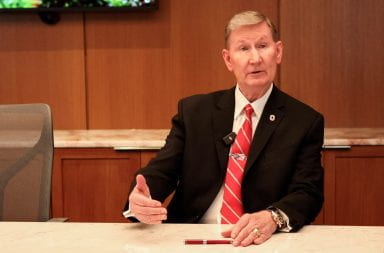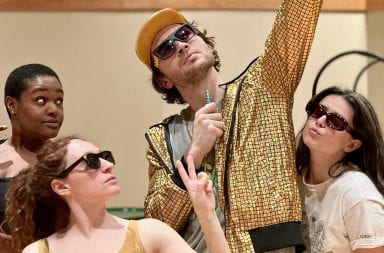When people hear the word “magic,” they might think of men wearing capes, waving a wand and pulling bunnies out of top hats. That’s not this kind of club.
Colin Haag, president of Magicians at Ohio State, has been doing magic since he was little, but when he went off to college he started doing magic less and less.
“The idea of starting a magic club had always been in the back of my mind. I wanted to join one but there were none,” said Haag, a second-year in mechanical engineering. “That was surprising. So I decided to start one.”
Magicians at OSU was created during Spring Quarter 2011. The debut of the club showed a strong student interest.
“We’re still trying to get off the ground,” Haag said. “We’ve got at least 100 people on our mailing list and 10 to 15 show up regularly for meetings.”
Group members range from basic beginners to established performers.
“I’ve been doing this professionally for about 10 years,” said Drew Murray, a second-year in civil engineering. “I saw Colin (Haag) at a festival, we exchanged emails, and that’s how I ended up in the club.”
Murray was interested in magic at a young age and, like Haag, has continued learning tricks.
“After shows, people will tell me ‘I got a magic kit when I was a kid but I gave it up,'” said Murray. “I got a magic kit for Christmas too, but I actually kept at it.”
The reason behind so few continuing practicing magic could be the expenses involved.
“You’re dropping thousands,” said Rob Pond, a fourth-year in electrical engineering. “But you’re making money.”
Take sawing someone in half for instance.
“That’s not something you do just for fun,” Pond said. “You’re going to be putting on a show if you buy the equipment to do that.”
There is a vast difference between stage shows and side shows. Haag said a magician needs to have the equipment necessary to put on their own show and the skill to draw in the crowd.
“As soon as you start going into stage (magic) there is a huge initial expense that you can make back in the end,” Haag said. “When you go into stage magic you’re starting a business basically. It is a great money making opportunity.”
Pond agrees.
“That’s how I pay for college, is off of stage shows,” Pond said.
Murray pays for everything through his performances.
“It’s my full-time job,” he said. “That’s how I pay my rent, my car, my tuition. I’m doing well with it, but I’ve put the work in to do so.”
The club has provided a way for magicians to connect and follow their passion for performing magic.
“I was here for three years and thought I was the only one,” Pond said, as the group nodded in agreement. “Magicians are different. We’re like different people entirely and it’s great to be around people of your own.”
Haag said there are sometimes misconceptions when it comes to magicians.
“Top hats and capes and rabbits out of hats haven’t been the thing for so long,” Haag said. “That’s one of my goals, to give people a more updated view of what magic is and what it could be.”
When performing shows, they dress in jeans and play Top 40 music. Their tricks are modernized versions of old favorites.
“There is a nice symmetry to it,” said Brian Flaherty, a third-year chemistry student. “All the old effects are still being used, you just update it.”
The use of doves is based off effects started in the 1900s.
“Nothing is really new, it’s just revamped,” Pond said.
The trick of sawing someone in half is still used, but not without modern tweaks.
“Magicians will do two sawing tricks at the same time, use two people, than add a twist by switching their bottom half,” Murray said.
No two magicians are the same, and Pond said each magician has their signature trick and unique talents.
“There really is no popular magician out there that embodies what magic really is,” said Pond. “If you go see a real magic show in Vegas they’re not going to come out in a top hat. That’s not what it is but that’s what everyone thinks it is. So magic is dying away.”
Although they are magicians themselves, members said they will still go watch professionals perform without trying to figure out how the trick is done.
“Even if you do know how they’re doing it, you still enjoy watching them perform,” Pond said.
Flaherty said even when you understand what is going on in the performance, one learns to appreciate it differently.
“You appreciate how the guy does it and then someone just steps it up and blows your mind, then you appreciate it even more,” Flaherty said.
The newest performer is Mitchell Romito, a third-year in biomedical engineering.
“I just started doing magic so when I watch performers I don’t know what to look for to figure the trick out,” Romito said. “By the time I think I know what they’re doing, I’m too amazed by the trick to know what happened.”
The club hopes to break preconceptions that others might have about magic by performing around campus.
“The goal is to show people that it’s not all creepy old men in tuxedos and bowties,” Murray said.


